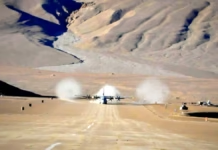In a world fraught with danger and uncertainty, the people of Pakistan face an array of complex challenges to their human security.
Over the past decade, the state of human security in the country has worsened significantly. The country’s position on the Human Development Index is 154th out of 189 countries, with a third of the population living below the poverty line.
The nation’s human security is threatened by several factors, such as poor health, insufficient education, a weak economy, low living standards, and high carbon emissions that are damaging the environment.
These issues are interconnected and have been compounded by the Covid-19 pandemic, now in its fifth wave. Some of the challenges are severe and require immediate attention to avoid a humanitarian crisis.
Human security is vital for a country for several reasons, mainly because it complements state security by providing a strong and capable population. In a world experiencing a revolution in warfare, human security has become crucial in combating fifth-generation hybrid warfare. If a country’s population is not free and does not enjoy fundamental liberties, it becomes vulnerable to manipulation through propaganda and can be utilized as a tool in hybrid warfare.
Human security is also an effective way to combat long-term problems such as extremism, tribalism, rebellions, and terrorism, which are significant issues in Pakistan. While traditional threats like India may or may not pose a risk to Pakistan, climate change and pandemics will inevitably adversely affect the country if the state’s approach to human security remains unchanged.
Challenges to Human Security in Pakistan
As an emerging country, Pakistan needs to prioritize efforts toward human security, as the deterioration of human security can potentially hinder the country’s prospects for success. In Pakistan, interconnected challenges exacerbate one another, making it difficult for the country to achieve sustainable human security.
Economic situation
Pakistan’s economy has never been in as dire straits as it is today, a far cry from its early years when it was not considered poor. This has led to an increase in human insecurity across the country.
The June 2022 economic update report highlights that Pakistan’s economy has been experiencing both periods of growth and decline. The report highlights that while Pakistan’s GDP growth rate was nearly 6 percent, the increasing fiscal and current account deficits were overlooked.
Political instability is on the rise in the country, and the high international fuel and commodity prices and the trade deficit have put tremendous pressure on foreign exchange reserves. As a result, the PKR has been significantly devalued against the USD, contributing to high inflation. According to the July 2022 Monthly Economic Update & Outlook, rising inflation and a large fiscal deficit have increased the country’s import bill, affecting its balance of payments.
Population
Pakistan is facing the challenge of uncontrolled population growth, which is hindering its plans to achieve self-sufficiency in various human development indicators, given its position as one of the world’s most populous nations.
According to the Pakistan Bureau of Statistics 2017 census report, Pakistan’s population is well over 200 million, nearly 60 percent higher than it was in 1998.
According to reports, the country’s population will surpass 400 million in the next four decades. This uncontrolled population growth is the root cause of many issues in the country.
The results of a survey conducted by the British Survey Council revealed that job and justice insecurity, along with economic inflation, are the top sources of anxiety for young people rather than terrorism.
Pakistan Bureau of Statistics 2020-21 labor force survey revealed a 6.3% unemployment rate in Pakistan.
The economic crisis and increasing population in Pakistan are causing concerns about widespread unemployment and food insecurity. The UN World Food Program (WFP) has reported that over 20% of Pakistan’s population is malnourished, and around 45% of children under the age of five suffer from stunted growth.
Limitations in infrastructure and inadequate human resources make it challenging to control or prevent the spread of COVID-19 or any similar disaster in Pakistan. Additionally, a large percentage of the population does not have access to health insurance or social security, further adding to the difficulty of the situation.
The governance challenge is magnified in overcrowded cities where the government lacks resources to adequately serve the large population. As a result, the quality of life for the people deteriorates, leading to predictable outcomes such as increased crime, frustration, anger, youth dissent, and more occurrences of violence.
Moreover, poor living standards have led to inadequate access to clean drinking water, low air quality index, and insufficient sanitation.
In a nutshell, the uncontrolled population growth in Pakistan has led to a degradation of various aspects of human security, including security and safety, justice, access to food and water, healthcare, housing, education, energy, sanitation, pollution, and transportation in both urban and rural areas. These factors have negatively impacted the quality of life for ordinary Pakistanis.
Health
Pakistan faces a challenge to its human security due to the state of its healthcare system, which is struggling to provide quality and accessible healthcare as a developing country, with only 3.38% of its GDP allocated to total health expenditures.
The insufficiency of Pakistan’s healthcare system is evident from the frequent outbreaks of infectious diseases, some of which are vaccine-preventable. For instance, Pakistan is among the three countries globally where indigenous wild poliovirus (WPV) transmission has yet to be eradicated.
As per the available data, approximately 50% of Pakistan’s population lacks access to essential healthcare services and proper sanitation facilities.
The persistent reasons for death in Pakistan include viral hepatitis, dengue, tuberculosis (TB), malaria, typhoid, Human immunodeficiency virus (HIV), and cholera, all of which are caused by urban overpopulation, inadequate sanitation, contaminated water sources, and inadequate socioeconomic conditions.
Lack of efficient governmental institutions
The absence of effective governmental institutions and competent individuals who comprehend the intricacies of human security is a grim fact in Pakistan. The lack of dedication and proficiency in crisis management before and during crises presents a significant threat to human security in the country, resulting in substantial loss of life and property during disasters.
Even those in positions of authority and power show no interest in improving conditions for most of the population. The COVID-19 pandemic has exposed the inadequacies of even militarily advanced governments that are entrenched in conventional security perspectives, often failing to address the COVID-19 crisis effectively and neglecting the fundamental security demands of their populations and societies.
Way Forward
Pakistan has undergone a significant change in its approach to security, with a growing focus on non-traditional security issues.
The country’s National Security Policy (NSP) for 2022-2026 provides a clear example of this shift, with an entire section (Section VIII) dedicated to human security. While the National Security Policy (NSP) has taken steps to address human security issues, much still needs to be done.
To address human security concerns, policies need to be prioritized and their implementation strengthened, along with establishing cooperation among all stakeholders.
Independent and effective state institutions are crucial for ensuring justice and safety for the population.
Skilled and honest individuals in top policymaking and implementing positions are necessary to develop ordinary citizens. There needs to be a shift towards implementing work ethics focused on responsibility, time management, and accountability.
State institutions must take significant measures to prevent political turmoil, disruption, and violence.
By addressing these challenges, Pakistan can strive towards achieving sustainable human security and improving the lives of its citizens.
**The views expressed in this article are those of the author and do not necessarily reflect the opinions of The Diplomatic Insight. The organization neither endorses nor assumes any responsibility for the content of this article.
Shameen Shafiq is an MPhil Schloar of Strategic studies at National defense University, Islamabad. She is an independent researcher with a keen interest in national and international affairs, focusing on well-researched writings.







